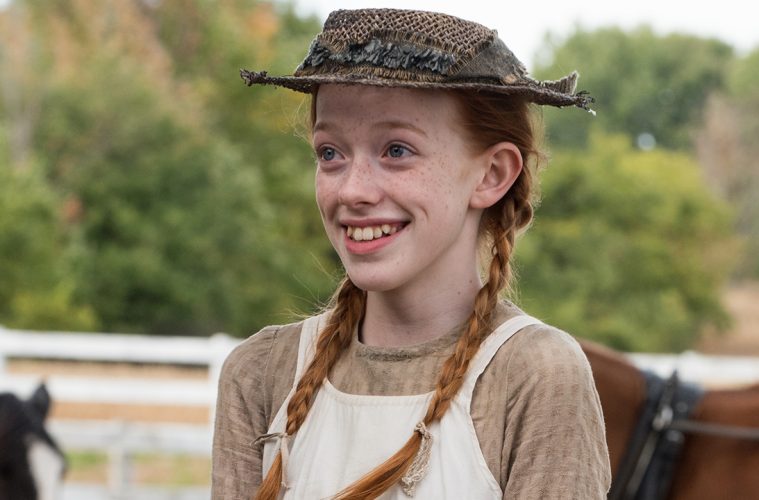“If all the world hated you and believed you wicked, but your own conscience approved of you and absolved you from guilt, you would not be without friends.” Wide-eyed orphan Anne Shirley eagerly recites this line to her traveling companion before declaring her love of another orphan-centred novel, Jane Eyre. It is the first of many Jane Eyre quotes sprinkled throughout the 2017 CBC/Netflix adaptation of Anne of Green Gables. Known to Canadian audiences as Anne, and American ones as Anne with an E, this adaptation leans heavily on its gothic Jane Eyre influence. In fact, each episode title refers to a line from Charlotte Brontë’s novel. The most intriguing parallel between the two orphans is their feminist subtext, and perhaps this is the first clue that Anne will be majorly departing from its source material.
Those expecting the Anne series to retain all the whimsy and escapism of the novel by L.M. Montgomery, or even the 1985 Sullivan Entertainment series starring Megan Follows, will feel as if they’ve landed in a “perfect graveyard of buried hopes.” While departing from source material is nothing new to television adaptations, the departure from the aesthetic of the Anne brand will be shocking to some fans. As a Canadian icon, Anne Shirley is predicated on the way she represents the Canadian Maritimes, rural life, and small-town values. In contrast, the Anne series relishes darker themes: abuse (physical and sexual), post-traumatic stress (triggered by some external source), poverty, class, and early feminism.
It’s little wonder that the show’s creator, Moira-Walley Beckett, an award-winning writer known for her work on Breaking Bad, would tease out the dark undertones in the beloved Anne of Green Gables story. In any modern re-telling of a classic story, contemporary attitudes naturally seep in. The series makes a valiant effort to lead by example, with an all-female production team and slate of directors, further emphasizing its re-vamped feminist approach to the story. Given the current climate of the entertainment industry, this is a huge step in the right direction and should not go unnoticed. In Anne, however, the feminist subtext loses its impact with tireless repetition and modern dialogue. There’s something slightly too forced in Anne’s emphatic plea to Marilla that “girls can do anything boys can do!”
Irish-Canadian actress Amybeth McNulty beat out 1,800 girls for the role of Anne Shirley, and it’s easy to see why. Not only does she fit the text description of Anne (down to the freckles and thin build), she has a sincerity that makes her instantly likeable and relatable. That said, the series struggles to give McNulty a clear direction for her character, making her unable to convey moments of subtle satire in her performance. Her ceaseless chatter, while injected with humour, verges on the melodramatic, which to some will be more irritating than endearing.
McNulty shines most during her interactions with acting veteran R.H. Thomson, who plays her adoptive father figure, Matthew Cuthbert. Thomson, better known for his portrayal of Jasper Dale on Sullivan Entertainment’s Road to Avonlea, has proven that his roots remain firmly in Avonlea. As Matthew, his performance is reserved yet likeable, quiet yet powerful. Without Thomson, the emotional moments between Matthew and Anne would not be as poignant.
Many of the episodes grapple with issues surrounding a woman’s place in both the home and community. These discussions are incredibly topical and were certainly embedded in Montgomery’s original story. There’s nothing wrong with extracting the feminist subtext for a 21st-century adaptation; after all, a story must grow and adapt with its audience. Yet, the target audience for Anne feels undefined. Perhaps for younger generations, modern feminist thought would not seem that out of place in Avonlea, but for some older generations, this feminist push is jarring, disrupting the otherwise well-executed historical accuracy of the series.
Aside from polarizing its viewers, Anne runs the risk of promoting a superficial interpretation of feminism by injecting it so frequently in the series. For example, Marilla is invited to join a “Progressive Mother’s Sewing Circle,” in which the local Avonlea women discuss the opportunities and education they would like their daughters to receive, all the while tossing around the word feminism like one of their tea biscuits. “Feminism… what an incredible word,” one mother says. “Intriguing, but what exactly does it mean?” another replies. No clear answer is provided, although it is entertaining to watch the conservative Marilla reluctantly take part in the conversation.
With all of this said, I would argue that this new Anne, at the very least, provides the catalyst for an important conversation. Just as Jane Eyre was later reappraised as an early feminist novel, perhaps the time has come for Anne of Green Gables to join in the conversation. Perhaps this is the only way the connection between the two orphans makes sense. What does it mean to re-assess beloved literary classics for a modern audience? Does a character like Anne have a place in a 21st-century narrative? In the wake of female empowerment movements like #MeToo and #TimesUp, Anne has a lot to offer a modern audience (if they’re willing to accept it) and it’s clear that this series is participating in a much larger conversation, one that extends far beyond the small village of Avonlea.

